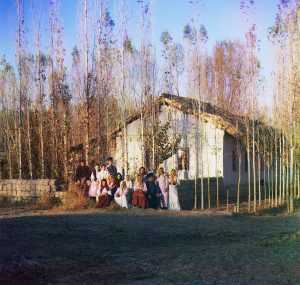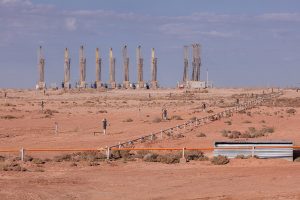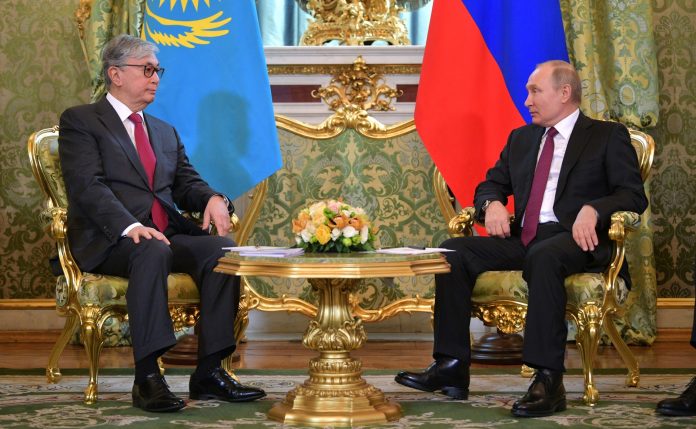Western sanctions against Moscow open up new opportunities for the Central Asian economic giant: independent international politics and fruitful energy cooperation with the EU
When Russia annexed Crimea in 2014, many in the leadership of Kazakhstan estimated that their country would be Moscow’s next target. Their reactions were cautious as their concern is maintaining a balance between the country’s largest economic partner and a desire to work with the European Union, the United States, and China.
Relations between Russia and Kazakhstan have been tensed since the break-up of the Soviet Union in 1991. Russia has repeatedly supported the Russian and Cossack separatist movements. Russia’s aspirations for the industrialized north of the Central Asian country, rich in oil, gas, and uranium deposits, have often been revealed by Kremlin officials. This induced President Nursultan Nazarbayev to refer to “Hitler methods” at an unsuspecting time.
However, Russia’s invasion of Ukraine is pushing Central Asian states away from Moscow. There is a dual opportunity for Kazakhstan: economic and political. The EU and UK’s shift to atomic energy is a potential opportunity for the country to increase its energy businesses in Europe. At the same time, Russia’s international isolation reduces the risk of invasion and softens the EU’s criticism of the Nursultan’s government (the capital’s name since 2019).
Attempts to distance oneself
The government allowed an anti-war rally on March 6 staged in the financial capital Almaty, attended by 3,000 people (a significant number for the country) who shouted “Long live Ukraine” and demanded Vladimir Putin should be on trial for crimes against humanity.
Kazakhstan abstained from the UN vote on the Russian invasion of Ukraine but diligently refrained from expressing any support for Moscow.
On March 1, President Kassym-Jomart Tokayev said his country should be on the side of peace and telephoned both Putin and Ukrainian President Volodymyr Zelensky.
However, according to officials, Kazakhstan is steadily moving away from Russia.
Russian minority and Russia’s aspirations
Kazakhstan’s independence found the country in an uncomfortable demographic reality. The Kazakhs were the minority and the Russians the majority. This situation changed in the thirty years that followed.
Before the Revolution of 1917, mainly nomads inhabited the area now occupied by the Central Asian republic. During the periods 1920-21 and 1926-39, when the Soviet regime forcibly imposed the sedentarisation of nomads, the population of the Kazakhs decreased dramatically. Population censuses estimated that more than one million people lost their lives. Hundreds of thousands migrated to China or moved to the rest of Central Asia and Siberia.
The settlement of colonists – mainly Russians, Belarusians, and Ukrainians – deteriorated the situation. The colonialist policy of the Soviet government intensified in the 1950s and 1970s.

[Russian settlers in Kazakhstan, 1911. Sergei Mikhailovich Prokudin-Gorskii]
In 1979, in the Socialist Soviet Republic of Kazakhstan, Russians made up 41% of the population and Kazakhs 36%.
The national government, after the independence, had to take steps to attract Kazakhs living in the rest of the former Soviet republics and China. Today Kazakhs make up 67.5% of the population, while the number of Russians has dropped to 19.8%.
Their language has a rich literature, making it the language with the fewest Russian influences in Central Asia. In 1979, 97.5% of Cossacks spoke Kazakh.
However, the existing solid Russian population in several parts of the country kept Russia’s aspirations active in the region. Since 1990, Moscow has supported secessionist Russian and Cossack groups in the North of the country.
In 1996 Cossack paramilitary groups sought to secede their provinces. At the same time, a Russian Duma committee expressed its deep concern regarding the security of the Russians in Kazakhstan. In 1997 the Russian border guard decided to assist the Cossack paramilitary groups. And in 1999, a secessionist attempt was made in the east of the country.
Is Kazakhstan Russian?
Threats from Russia against Kazakhstan’s national integrity were frequent and expressed by officials.
In November 1993, then-Russian Foreign Minister Andrei Kozyrev said Russia was willing to react harshly if necessary to protect the rights of Russians in the former Soviet republics. It is surprising that the same politician, three decades later, called on his country’s diplomats to resign in protest of the Russian invasion of Ukraine. In 1993, however, his statement provoked an immediate reaction from the President of Kazakhstan, who, according to Reuters, stated that “When someone talks about protecting the Russians, not in Russia but Kazakhstan, I remember the years of Hitler, who began protecting the Sudeten Germans.”
In 2014, in the wake of the annexation of Crimea, Putin said that “Nursultan Nazarbayev created a state in an area where there was never a state entity; the Kazakhs never had a state.”
Statements by his party’s deputies followed, calling on Russia to annex northern Kazakhstan. Putin’s far-right ally, Vladimir Zhirinovsky, has called for the annexation of the entire country and the creation of a “Central Asian Federation.”
But there are more people in Kremlin to foment the prevailing ideology. Duma’s deputy, Vyacheslav Nikonov, in December 2020 challenged the very existence of Kazakhstan, saying the region was a “nomadic desert” that Russia had donated to the Soviet Union. Nikonov is the grandson of Vyacheslav Molotov, the architect of the Ribbentrop-Molotov Pact in 1939, which paved the way for the Nazi invasion of Poland and a member of the ruling party.
In the same year, another member of parliament for the United Russia party, Yevgeny Fyodorof, spoke of a “gift” from Russia to the USSR. Fyodorov is the party’s Central Political Council member and leader of the far-right National Liberation Movement.
Kazakhstan-EU: new prospects for energy cooperation?
Russia’s invasion of Ukraine is already having a detrimental effect on Kazakhstan’s economy. At the beginning of the year, officials estimated the economic growth rate at 3.9%. Now it is estimated at 2.1%.
90% of Kazakhstan’s gas exports pass through Russia. The same goes for oil. The country reduced its production due to sanctions.
The new situation paves the way for economic partnerships with key players such as the EU, the US, China, and Turkey.
The EU-Kazakhstan Cooperation Council met in Brussels in early April. This time the Kazakh delegation was large and of a high standard. The ministers of foreign affairs and national economy, and their deputies, together with the human rights commissioner, took part.
Timur Suleimenov, deputy director of President Tokayev’s office and one of his closest associates, was very clear in his interviews about Kazakhstan’s stance.
As he told the Euractiv news website on March 29, “even if we are part of the economic union with Russia, Belarus, and other countries, we are also part of the international community.”
He called on European companies in Russia to relocate to Kazakhstan in an interview with Politico. He said his country is “the most westernized in Central Asia.”

Diamond drill at Kazatomprom’s Karatau Mine, Kazakhstan [Creative Commons Attribution-Share Alike 4.0 International license. Author NAC Kazatomprom JSC]
Kazakhstan is the largest uranium producer in the world. The transition from Russian gas to nuclear energy, which many European countries see as a solution to their energy security, could upgrade Kazakhstan’s energy relations with the West.
British Prime Minister Boris Johnson said on March 28 that the United Kingdom could increase its use of atomic energy by 25%. Kazakhstan is the third-largest supplier of uranium in the EU. The Swedish energy giant Vattenfall AB buys uranium from the central Asian republic.
As uranium prices have more than doubled since January 2021, forecasts for agreements are very optimistic.

